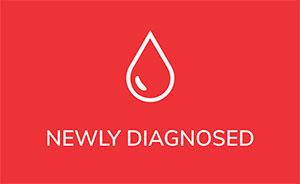
By Meldon Kahan – Patient
I was diagnosed with CLL in July 2013. I had a blood test for a sore throat. The lymphocyte count was only 5 – borderline – but it was a shock. My wife and I met with the oncologist who told us we were on “watch and wait”, with blood tests every six months. I had no lymph nodes and my hemoglobin and platelets were fine. But like most patients we weren’t entirely comfortable with watch and wait. Over the next two and a half years, the absolute lymphocyte count climbed to 30,000. After each blood test, we were depressed for days. I took supplements, like EGCG, curcumin and vitamin D and others. Maybe they helped slow things, but they didn’t stop the inexorable rise in counts.
My wife became an avid reader of Health Unlocked and other blogs. In one entry, a woman posted that her husband was considering a trial on ibrutinib run by Dr. John Byrd from Ohio State University. Unlike other trials, this study was intended for asymptomatic early CLL patients who had not yet received treatment (“treatment-naïve”) and were on watch and wait. She was intrigued and read anything she could find about the trial and other similar studies. She found out that a German trial is also studying ibrutinib in treatment naïve patients who would otherwise be on watch and wait.
So we decided to visit Dr. Byrd. This was a pretty big decision for us because we live in Toronto, and our health insurance does not cover medical care in the US. But we decided to check it out anyway. In our province (Ontario), health insurance does not cover ibrutinib, except for patients who have relapsed on previous treatment or who have a 17p deletion.
Prior to the visit, we had to ask our oncologist for a FISH test. Oncologists in Ontario do not routinely do FISH tests for patients on watch and wait, but fortunately he agreed. We also had to order a series of tests from a private lab in the US.
We were very impressed with Dr. Byrd and his team. They were gracious and clear. They reviewed my results: Unmutated IGVH, 13q deletion (28%) but no 17p deletion, simple karyotype, and NOTCH 1 positive. Dr. Byrd explained that these results mean that I will inevitably need treatment several years from now, and over time, my lymphocytes would undergo “clonal evolution”, with new deletions and mutations. This would make me more resistant to treatment, so I would need longer treatments or combination therapy. Early use of ibrutinib, however, could prevent clonal evolution and might even cause the extinction of all the cancer clones. This would ensure that I was “MRD negative”, i.e. the blood and bone marrow would show no evidence of cancer. The ibrutinib could be stopped after two years, and I would be in long-term (hopefully life-long) remission.
This is the theory, but clinical trials such as Dr. Byrd’s and the German trial are needed to prove that this is the case. So we decided to go ahead. I did not want to do chemotherapy, which would be necessary for me to get ibrutinib in Ontario; chemotherapy usually doesn’t work as well with unmutated CLL and can make people resistant to ibrutinib (so why does the government have this rule? To save money of course). And I really am hopeful that I would achieve MRD negative status and could stop ibrutinib after two years.
The trial is a randomized trial, but both groups get ibrutinib. The ‘immediate treatment’ group gets influenza and pneumonia vaccines, followed immediately by ibrutinib; the delayed treatment’ groups gets the same vaccines, followed by ibrutinib 12 weeks later. The hypothesis is that ibrutinib will improve the body’s immune response to vaccines.
Unfortunately I was randomized to the delayed group. I have finished my vaccinations and I start ibrutinib in a few weeks. In the meantime it has been somewhat of an ordeal. We have made the 400 mile trip to Columbus five times (by plane, bus and car). I have had a bone marrow biopsy, three CT scans, and numerous blood tests. The trial covers the medication, but we have had to pay for the tests and the office visits because they are part of routine clinical care. But we strongly feel it will be worth it. And the staff at the James Cancer Center have been wonderful.
Now we’re anxious about how I’ll respond to ibrutinib, but we’re also optimistic and hopeful. It would not have been possible without the brilliant and dedicated researchers at OSU and in many other places around the world. But most of all it wouldn’t have been possible without my wife, who never stopped looking for answers and who has been my rock throughout my journey with CLL.
Meldon Kahan was born in 1953 and grew up in the Canadian prairies (Saskatchewan). He received his medical degree at the University of Toronto. He lives in Toronto with his wife of 35 years, Ileana. He practices addiction medicine at Women’s College Hospital and does research at University of Toronto. He has two children (both doctors!) and two adorable grandchildren who live in Florida.
Originally published in The CLL Tribune Q4 2016.

















